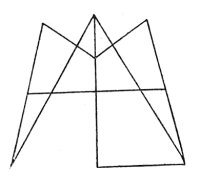
Masonic, Occult and Esoteric Online Library
The Comte De Gabalis
By Abbé N. de Montfaucon de Villars
Bacchus and Osiris the Same
"Now that Osiris is really the same with Bacchus, nobody can be supposed to know better than you, O Clea, not only as you are chief of his priestesses at Delphi, but moreover as you are initiated, in right of both your parents, into the service and religion of Osiris--As others, however, may not be so well satisfied in this point; to omit the evidence which may be brought in proof of it from those more secret rites which are not to be divulged, do not those very cere- monies, which the priests perform in public, when they carry the Apis on a raft to his funeral, correspond entirely with what we see done in the festivals of Bacchus? They hang round them the skins of hinds, they carry javelins in their hands crowned with ivy, make the same sort of howlings, and use the same kind of gesticulations as the votaries of Bacchus are wont to do, whilst they are celebrating the orgies of their God. Hence likewise is it, that so many of the Greeks, in their statues of Bacchus, have given him the visage of an ox; that the women of Elis in their prayers to him, call upon the God with the oxe's feet to come unto them; and that the people of Argos not only give him the appellation of Ox-begotten, but likewise invoke him, and endeavour to raise him from his watry dwelling by the sound of the trumpet, throwing at the same time a lamb into the deep, as a kind of fee to the porter, who keeps the door of the infernal regions for letting him pass: these trumpets are concealed by them under boughs of ivy, as Socrates relates in his treatise concerning the Delphic Hosii--So again, the histories upon which the most solemn feasts of Bacchus, the Titania and Nuktelia, are founded, do they not exa&ly correspond with what we are told of the cutting in pieces of Osiris, of his rising again, and of his new life? Nor does what relates to his burial any way contradict this notion; for whilst the Egyptians, as has been already observed, show many places as the sepulchres of their Osiris, the Delphians pretend that the relics of Bacchus are deposited with them, and that they lye near the oracle.: and in consequence of this opinion, the Hosii, or priests appointed for that purpose, perform a secret sacrifice in the temple of Apollo, whilst at the same time the Thyades, or priestesses of Bacchus, with their hymns endeavour to raise their God, whom they at that time distinguish by the name of the Winnower. Now that the Greeks themselves do not look upon Bacchus as the Lord or President of wine only, but of all kind of humidity in general, may be sufficiently proved from the testimony of Pindar, where he says "may bountiful Bacchus, the bright glory of the year, make all my trees fruitful;" thus likewise the votaries of Osiris are expressly forbidden to destroy any fruit-tree, or to mar any springs of water.
But to resume a while our former argument concerning the identity of Bacchus and Osiris; as a farther proof of this point, we may mention the Ivy, which as it is esteemed by the Greeks sacred to Bacchus, so is it likewise stiled by the Egyptians, in their language, Chenosiris, that is, as some interpret it, the plant of Osiris. In like manner Aristo, who wrote a treatise of the Athenian Colonies, tells us, he somewhere met with an epistle of Alexarchus, wherein Bacchus was expressly said to have been the son of Isis, and to heve been named by the Egyptians not Osiris, but Asiris, with an A; a word, in the language of that country, signifying strong and mighty: and this is farther confirmed by the testimony . of Hermaeus, who, in his first book concerning the Egyptians, gives us a similar explication of the name Osiris himself. . . . there is no need of any other evidence than that I have formerly made use of, drawn from the similarity, which may be observed, between the festivals and. sacred rites of these two Gods, a proof much more strong and convincing than any authorities whatever can be."
PLUTARCH'S TREATISE OF ISIS AND OSIRIS, §35, §37. TRANSLATED BY SAMUEL SQUIRE, A.M., 1744.

